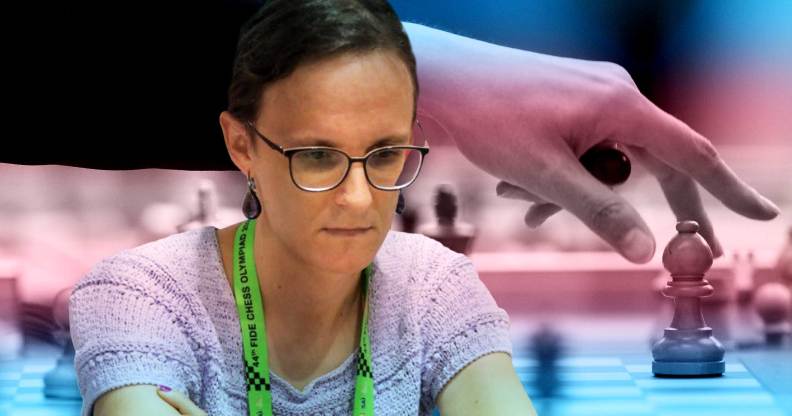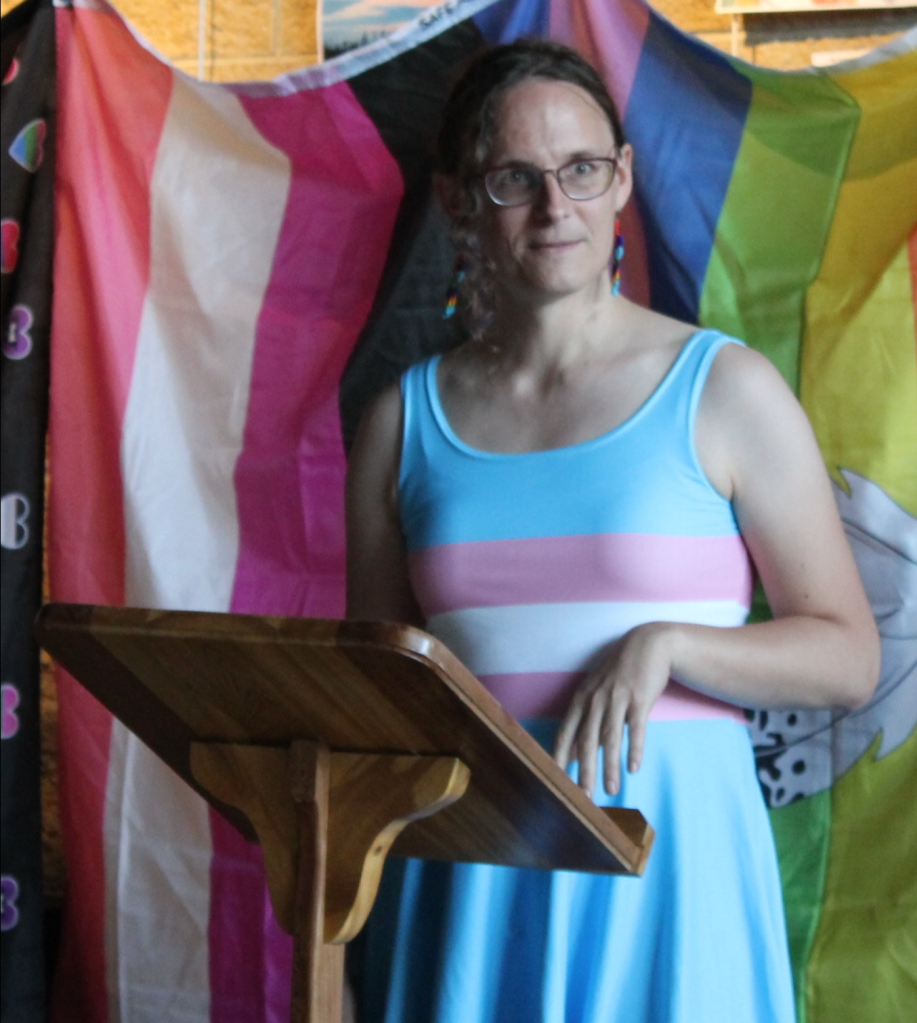Trans chess master found ‘home’ in the game and ‘a place for interacting despite our differences’

Morgen Mills achieved a woman chess master title in 2022. (Credit: Morgen Mills / Getty Images)
Chess is, by its nature, an inclusive game where people of all ages, genders and backgrounds can play against one another. And it’s a place where Morgan Mills, a trans player, found a home.
The game was thrust abruptly into the spotlight earlier this month after the International Chess Federation (FIDE), the body that regulates international competitions, announced a new set of regulations about trans players in its sanctioned competitions.
The policy states that trans women have “no right” to compete in official events for women until a further decision is made, which could take two years. It also strips trans men of any women’s titles won previously once they had transitioned to male.
Despite the recent policy, Morgen Mills, who achieved a woman’s master title in 2022, tells PinkNews she’s had a “good” experience in the chess world since coming out as trans.
Mills made history last year as the first trans woman to represent Canada’s women’s team at an international competition when she played at the Olympiad in Chennai, India.
She began playing the game as a child with her dad and a friend of her father. Throughout her life, she kept encountering it whether it was in high school, where there was a “more serious chess club”, or playing internationally, and eventually representing Canada at tournaments.
“I was a chess player long before I transitioned,” she says. “Like many trans people, it’s not like I was unaware of my difference, but I’m 38, and 30 years ago – I won’t say we didn’t have the language, but I at least didn’t have the language or the concepts to appreciate my identity of the concept of a trans community.
“So, I wasn’t consciously looking for it or thinking about myself in terms of a relationship. For me, although I was trans before I was a chess player, I was aware of being a chess player before I was aware of being trans.
“When I transitioned, I transitioned socially absolutely everywhere, except chess.
“I wasn’t necessarily reluctant. I was completely dedicated and committed to doing it, but I was just dragging my feet a bit because I wasn’t sure what the community would be like. But it’s been good.”
‘We’re being excluded’
In an interview with CBC, Mills said the FIDE ban “came out of nowhere and that the community wasn’t aware “this was an issue that was being discussed”.
She expressed “disappointment” and “dismay that we’re being excluded”, and said the new policy tells trans women they “aren’t welcome” in professional chess.
Speaking with the New York Times, she said the change “really surprises me” because “nobody indicated any problem at all”.

After FIDE announced the new rules, Yosha Iglesias, a transgender FIDE master and chess coach from France, wrote on social media that the policy made it sound as if trans players are “the biggest threat” to women in chess.
In a later post, Iglesias said she has two chosen families, composed of chess players and queer people, with her closest ones intersecting both communities. She thanked them for “having defended trans rights in the chess world”, in the wake of FIDE’s policy change.
Like Iglesias, Mills found a community in chess.
“My inclination is always to celebrate and be positive because I love the chess community, and I’ve found a home there,” she says.
“But I think it should be pointed out that I don’t know if acceptance is necessarily the right way to characterise it – in the same way that at any chess tournament, you can have a wide range of socio-economic classes, international backgrounds, ages and so on.
“It has less to do with people connecting and accepting one another than it does to do with them interacting despite differences.”
While it’s great to be in a place where your identity doesn’t matter much, that’s not the same thing as acceptance, she points out.
She recalls how one of her friends at university, who was a female chess player, “drew this distinction between chess friends” and real-life friends.
But she saw how chess friends are “more enduring” because the “scope of the relationship is so limited” and that players “don’t care about anything or anything about you [apart] from how you banter at the board”.
Mills goes on to say: “In some ways, it can feel invalidating if you’re looking for that kind of connection, but it’s also deeply reassuring. It’s a great equaliser. They’re indifferent for the most part, and sometimes that’s exactly what you want.”
FIDE is the latest in a growing list of organisations to have banned trans women from female events.
Despite having no evidence that trans women are a threat to cis women players, FIDE said that, while men and women are “equally intellectually capable… other factors like physical endurance may play a role” in the game.
Several international chess federations – including those in England, Germany, France, Finland and Canada – have come out against the new regulations.
The US Chess Federation also reiterated its trans-inclusion policy, first introduced in 2018, which allows a person to identify as they choose. In a recent note, the federation added: “Inclusion. We believe everyone has a seat at the chess table.”
Intense backlash from chess players and trans rights advocates
The National Center for Trans Equality said the policy “relies on ignorant anti-trans ideas [and is] insulting to cis women, to trans women and to the game itself”.
FIDE should “reconsider these anti-trans regulations”, said Jovanka Houska, an English chess player with the titles of international master and woman grandmaster.
“There is no shame in backtracking and consulting afresh with trans women and women so that the chess world moves forward with fairness,” she wrote on X, the platform once known as Twitter.
“Together, we can create a progressive, fair and welcoming space for everyone.”
In an opinion piece for MSNBC, Jennifer Shahade, a FIDE woman grandmaster and two-time US women’s champion, called the new policy a “smoke screen [to] divert attention” from the chess world finally reckoning with sexual assault and harassment.
On 3 August, top female French chess players wrote an open letter declaring that sexism and sexual violence are “one of the main reasons” why women and young girls stop playing the game.
More than 120 women players, managers, arbiters and people in the world of chess co-signed the letter.
In response, FIDE said it would work on a “safeguarding policy for women in chess”, adding that it wanted to “improve the culture” and make the game’s community a “safe, respectful and friendly space for everyone”.
How did this story make you feel?

